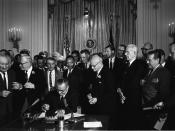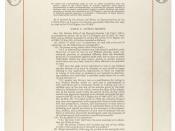The Equal Employment Opportunity Commission (EEOC) is a federal government agency that was developed to enforce anti-discrimination employment laws and civil rights laws, including Title VII of the Civil Rights Act of 1964, which prohibits employment discrimination against race, color, religion, sex, or national origin (EEOC website, 2006). The Civil Rights Act of 1991 was later passed allowing the charging party to a jury trial and an attempt to recover compensatory and punitive damages for violation of Title VII. Title VII of the Civil Rights Act of 1991 was amended and incorporated disparate treatment and disparate impact. In this paper, I will discuss one case each demonstrating disparate impact and disparate treatment, including the facts and ruling of each case, and specific implications of the ruling for my employment environment.
Disparate Impact: Griggs v. Duke Power Co., 401 U.S. 424 (1971)
"Title VII" specifically exempts professionally developed employment tests of eligibility from disparate impact claims of disparate impact claims of discrimination, as long as the test is not designed, intended, or used to discriminate on the basis of membership in a protected class" (Bennett-Alexander & Hartman, 2004, p.
524). In Griggs v. Duke Power Co., African-American employees of Duke Power filed suit on their employer alleging that Duke Power Company's requirements of a high school diploma or passing score on an intelligence test for employees to continue being employed or transfer positions violated Title VII of the Civil Rights Act. The complaint was based on how the company's requirements excluded and discriminated against the African-American workers, a minority group, of which are protected by Title VII and caused a disproportionately low number of those groups to apply for employment at Duke Power.
Court Ruling and Reasoning
According to the case on FindLaw.com:
Negro employees at respondent's generating...


